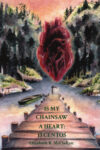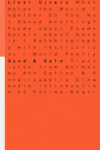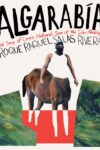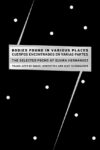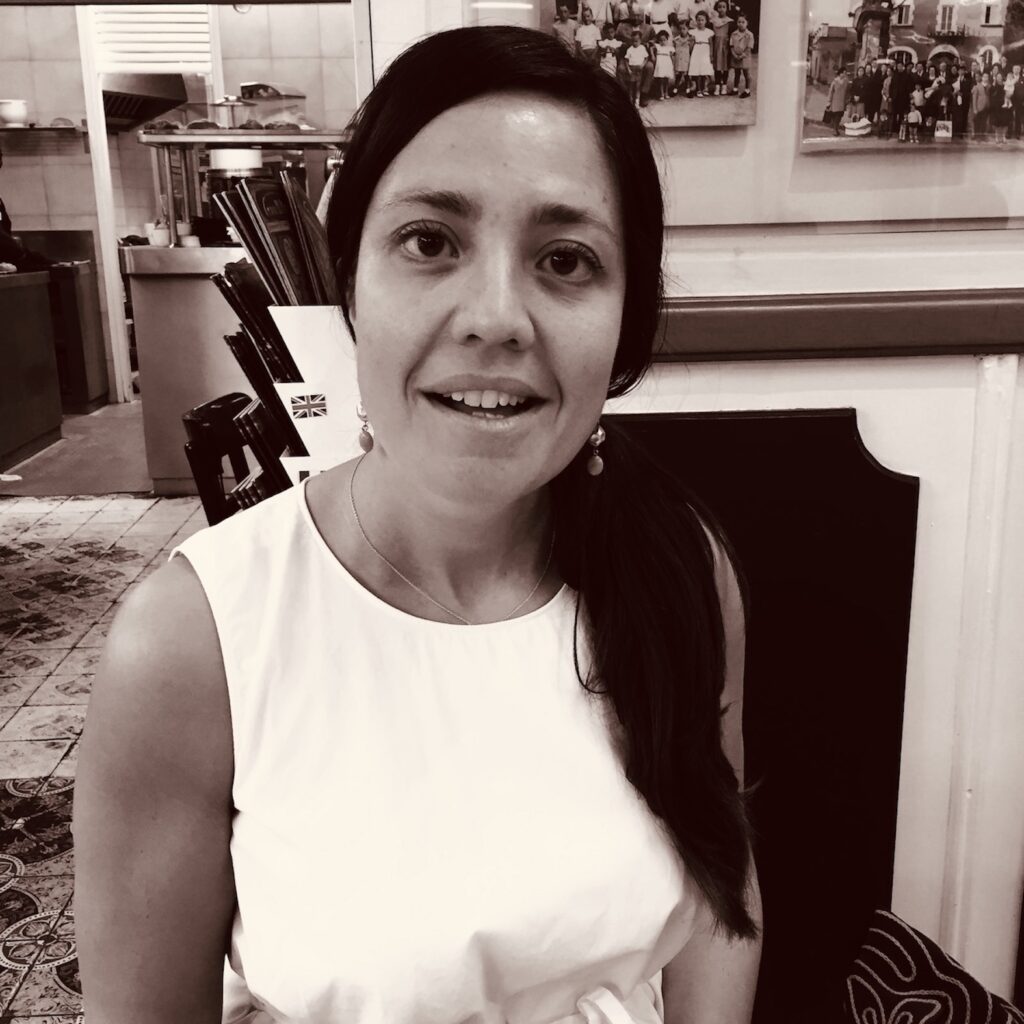
What follows is a conversation between the poets Catherine Theis & Lily Brown. Lily’s new collection Blade Work has been published with Parlor Press, while Catherine’s By a Roman has been published with Antiphony Press.
Catherine Theis: Good morning, Lily! I’m excited to start this exchange. I’m about to go on a bicycle ride, so I will keep this short and sweet. I should have sent you this message yesterday, but I had to do all these various things I wasn’t planning on doing. Such is life, right? As you know, I adore the precise images in your poems. And the way you layer language in these clean, cool lines. What interests me—especially because I don’t know exactly how it happens in my own work—is how do you start a poem? Where does it come from? What’s your life strategy with art-making, how has it changed over the years?
Lily Brown: Hi, Catherine! I’m so excited for this exchange, as well. This summer has been nonstop in terms of travel and family time—I’ve been feeling like my whole summer has been about facilitating my daughter spending time with her cousins on both sides of the family. I have maybe become obsessed with the idea that childhood is finite, and it’s my job to create the conditions for these memorable experiences. I guess I’m sharing this both as an excuse for my snail’s pace in responding to your excellent questions and because I haven’t been writing much, but I wonder if my curatorial instinct in approaching summer bears some similarity to my approach to writing poems. I agree that my poems (at least most of the ones in print!) have some precision to them, but they do not always start that way.
I used to say that poems started for me as daydreams—images that floated through my consciousness and that I was quick enough or aware enough to sort of pluck out of my thoughts and imaginings. Lately, though, since becoming a mom, I would say that has changed. I don’t daydream as much, likely because my brain is so crammed full of tasks I need to get done, and my daily schedule isn’t really about me anymore. I also have less time for writing. The last few years, I have tried to steal part of a day here or there for writing, though. We moved to Maine during the pandemic, and we live about 40 minutes from an off-the-grid log cabin my great grandparents built 100 years ago. Sometimes I drive up there and sit on a cliff over Quahog Bay and write. In those cases, the poems come from what I’m looking at and then those images combine with the daily contents of my life—my feelings, moments with my daughter, interactions with my spouse, house chores, teaching. I think precision comes during the revision process—which maybe we could think of as a curation of sorts?—at which point I cut a lot from my poems, create lineation, and generally try to find ways to increase the sense of tension and concision in my work.
I recently did a Q&A with my friend Allen Frost at the Nueva School, where I used to teach, and he asked me a great question about what I’m willing to let into the poems from the outside world, particularly the technological world. He had noticed that I mentioned texting in one poem and Instagram in another. Answering his question made me realize that I have been letting more of the full breadth of experience into my poems of late. I’m maybe less worried about every single part of the poem being appropriately “poetic” and more interested in the messiness of daily life being expressed. Surely this must be related to motherhood, as well—I have been humbled by how much messier my life is since becoming a mom, both in terms of physical mess and just a general lack of control. I don’t think I was aware, prior to parenthood, or how much I liked control. There’s nothing like the entry of a child to call attention to that particular habit of mind!
These days, poems also start for me during a wonderful writing group I joined in Portland, Maine. The group meets every week for dinner and communal writing. Most of the writing I’ve done in the past six months has originated in that space in response to prompts from the group’s members. Given my general state of overwhelm, this addition to my life has been a wonderful way to guarantee I’m doing some writing and have a space in which writing happens.
I think I’m rambling a bit, and I’d love to know your thoughts on some of these same questions—how has your artmaking changed since you became a mother? When and where do you write? How do poems start for you?
I had no idea about the log cabin your great-grandparents built! I’d love to see it someday. I like knowing you having two poles to your writing life—one where your visit an ancestral home by yourself, and another where you commune with a group of writers over dinner and language. I love cooking and food and sharing meals. I hope someone made you “rice krispy treats” and “nectarine-infused water.” That kind of hospitality really does wonders, I know. I think meeting every week might be another key, right? Less pressure and more time to practice just doing, just writing without critique. Yeah, being a parent is high stakes ALL THE TIME. My husband and I just walk around the kitchen, whispering, “It’s relentless. Just relentless.” Because it truly is. Being a writer and being a parent are really at odds with one another. But the best things in life never make any outward sense. I love being a writer and a parent. But the percentages are in constant flux, I’m never equal parts writer and parent. I’m like one of those carpenter levels that your ancestors must have used when building a house, very sensitive to changing angles and gradients.
I mean, I totally understand the impetus to drive 40 minutes and sit in silence. Either in the car or in a beautiful landscape. It’s important for me to step away from my everyday life and notice the difference when I’m not “in” it. I’m more appreciative and not as judgmental of myself or others. Lately, that’s how I’ve written my new poems. It’s almost as if I step out of the scene of my life or something. It sounds dramatic, I know, but it’s the truth. For example, the last poem I was really excited about writing happened when I was visiting my extended family. All the cousins were busy playing with each other, my husband was helping another family member, so it was just me in this big, beautiful yard with my notebook. I was in a bad mood, but then something allowed me to depart from all the familial mayhem and I found a kind of privacy that spun me out. I just wrote whatever I wanted and didn’t stop myself. I just pressed on in that sunshine and privacy. That’s what I live for—that sense of writing as departure from where I currently am, or who I currently am. I know a lot of poets write biographically, but I almost never do. Even when I try to harness my life history, it becomes this strange other thing.
“Made in Los Angeles” is a poem from my new book, By a Roman, where I do kind of write about myself, but it doesn’t seem that accurate to me. The facts are there, but they don’t add up. (I think this is a line from another poem.) One of things I’ve been trying to do lately is to include more unpoetic things like Instagram or text messages in my poems because I, too, want to write my own brilliant “Hedgehogs of Instagram” poem. I always feel that violent tension in your work between the constructed poem (its thingness) and the feeling that precedes it, pushing it to closure. But my poems always start in sound for me—I hear a line before I can see it. Then the line becomes a little speech.
Now I usually write in those parceled-off moments, either in between school semesters, on family trips, or on long holidays away from home. I think writing away from home also inspires me. I prefer writing in the mornings before my overthinking takes over and things get ugly. I need to not be too cognizant of what’s going on. I’m not a super early morning person, but I like a quiet morning with good coffee and an open window. I like having the freedom of moving around my kitchen or organizing my closet while I think, work. So, yeah, I like working at home in the mornings AND I like writing poems when I’m traveling in a strange hotel room. And yes, I expect my husband to read my mind!
Your book, Blade Work, opens with a lovely poem, “Venus Transit” that has lots of great thinking sounds in it: “I know both sides: / the violence of artifact / and the living tree, / airy branches full of weeds.” What I mean by “thinking sounds” is that the music in many of your poems inspires, as well as mimics, cognition, where thought, experiences, and the senses all are working to achieve a kind of knowledge or understanding. Your Dickinson epigraph for the book confirms this for me. Also, the variety of your diction, which surprises and delights. As a reader, I am constantly fine-tuning my course, I must remain alert to the twists and turns. I also read Wallace Stevens in your poems and, of course, Elizabeth Bishop since “The Complete Poems” is an aftering of her work. But can you tell me a few poets whose work inspires you that I would never guess? What are you reading now? What were you reading ten years ago?
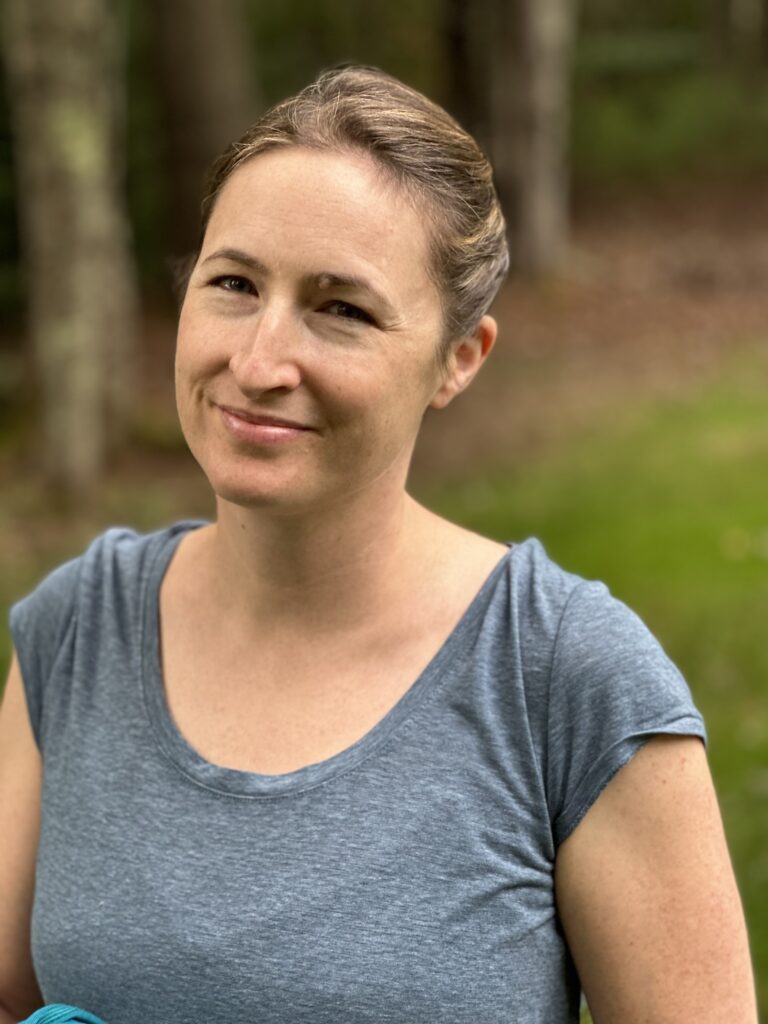
Ohhh which poets inspire me who you would never guess… A good question. I haven’t been reading a ton of contemporary poetry, but one contemporary poet whose work I love is Robyn Schiff. I love the movement of her lines, the way her lengthy and complex sentences interact with the poetic line, her syllabic forms, her steady lyric “I” that feels to me not confessional but inclusive of the personal, as well as cultural and political experience. There’s a balance to her work that I love. Maybe surprisingly, I’ve become more interested in Frost in recent years. Teaching and tutoring high school students has exposed me to more Frost poems and has forced me into conversations with these deeply New England-inflected pieces that I haven’t read or thought about much since I myself was a high school student growing up in New England! I think partially I tend to be surprised when I read something so canonical and then find something strange or unexpected within it, like the truncated last line of “After Apple-Picking,” “Or just some human sleep,” which feels like a halting and sudden ending to the poem’s previously dreamy and meditative tone. Earlier this year I was reading Diane Seuss. I love re-reading Michael Palmer, Jack Spicer, Marianne Moore, Muriel Rukeyser, Lyn Hejinian. I’m always interested in Stevens and Dickinson. I could go on! Ten years ago I want to say I was reading more fiction—Annie Proulx, John Steinbeck, Virginia Woolf, Arundhati Roy. And for poets, more contemporary writers were probably on my bedside table then: Rachel Zucker, Anne Waldman, Catherine Wagner, Graham Foust, Matthew Henricksen, Molly Brodak.
But my relationship to reading has been changed in ways I lament daily by my relationship to technology. I’m thinking seriously about getting a “dumb” phone and trying to break up with my smart phone. I don’t think I read the way I used to, and I also don’t think I have the unencumbered time to daydream during my daily life that I used to before I had this technological appendage in my pocket at all times.
Enough of me, though—I’m really curious to know more about your comment that you “almost never write” biographically. In the past, I’ve noticed the use of myth and allusion in your work, but recently I’ve read several of your new poems online, and I’ve projected biography onto them, but I wonder if I’m wrong to have done that. For example, I just reread the poem “New Year’s Day” in Antiphony Journal. I love the register of this poem; the tone feels like a cross between Barbara Guest, Sylvia Plath, and Wallace Stevens to me; there’s a matter-of-factness to the voice: “Good morning, gold watch / I don’t have to go anywhere — // Two figures / Playing in the sunshine // // A tableau in reverse.” Is this poem from your new book? I hear a little bit of Plath’s “Morning Song” in the gold watch, and an echo of “Thirteen Ways of Looking at a Blackbird” in some of the sections, like number four: “The whir of the hummingbirds / The barking of the dogs / The strawberry tree grows its own fruit of pain / Just like we all do / Within the absent whole.” The juxtaposition of the concrete details with the “fruit of pain” and “the absent whole” no doubt reminds me a little bit of Stevens, but of course the particular lexicon is all your own. In a poem like this, with a recognizable “I,” does that “I” feel very disconnected to your biographical experience? I’d love to hear more about how you see the relationship between your self and your poems, and if they tend not to be biographical, what are other ways you might describe them? (These questions aren’t meant to imply that poems *must* be biographical, but I’ve always wanted another way to describe poetic experience and the poetic mechanisms I try to create in poems, so I’m fascinated to hear how you think of your work in these senses.)
Before I forget, I wanted to mention that Frost’s “Directive” is one of my favorite poems. I wasn’t ever a huge Frost fan, but you’re right—there’s a strange kind of darkness, or an emotional bluntness he’s able to conjure up in his poems that is fresh, startling even. I keep re-reading many of his poems. I really like that last line you quoted from “After Apple Picking.” You don’t know, we’ve never spoken about it, but I’ve tried for years to write my own version of that poem. I’ve never been successful, but you’re reminding me to try again. That distinction between “human sleep” and the hibernation sleep of a woodchuck is thrilling! His poems have that ludic quality to them. We forget that Frost really is a Modernist. I mean, I know he sounds nothing like H.D. or T.S. Eliot or Mina Loy, but he’s working with the fragments and tragedies of myth or medieval romance, as is the case with “Directive,” like so many of his contemporaries. He’s putting together the fractured moments of a terror-stricken, turn-of-the-century population who has endured World War One and will go on to endure another war. He’s never really constellated with the rest of modernist poets, probably because he decided to return to New England and isolate. “Directive” is such a weird, commanding poem: “Drink and be whole again beyond confusion.” Well, that does sound like Eliot. But that’s exactly why I come to poems. I want an invitation and a command inflicted upon me. Boss me around to a better place, I say.
Anyhow, I just wanted to mention that. As far as this question of biography and self-making in poetry is concerned, you’re right, I’ve been shifting strategies and modes in my recent work. “New Year’s Day” is a new poem—maybe one of five or six—that specifically works with a first-person speaker who is closer to the real-life me than ever before. This poem is actually not in By a Roman, but it does extend mediations put forth in the book about the interiority of a voice and the truthfulness of that voice; how artifice works in poems. Poems for me are largely rhetorical—they allow me to make sense of emotional things in a logical way, but they don’t seek a direct answer or describe real events, usually. In short, I value impersonality in poems.
This has always been my preferred mode. I’m more interested in creating atmosphere, tone, or impressions that the reader can follow or track in their own thinking. I consider these poems to be versions of me, or different imaginings of self. Partly what I’m talking about is estrangement from self. Can I start with something from my life, but then defamiliarize it? Can I also say this: I really get tired of myself sometimes. I like reading poems, and other literatures, because I’m able to access another consciousness that is not my own.
Also, I’m deeply fascinated with other people! I find other people’s habits, proclivities, desires more interesting than my own. But at the same time, I don’t want to know everything about a person. I much prefer a cultivated mystery. Or maybe it’s that sense of getting to know a person slowly and surely. The best poems, I think, are the ones that allow room for a reader’s consciousness, they just don’t impose their will or story upon a reader. I mean, I’m fascinated by people, but I don’t want to hear every bad thing that’s ever happened to them. I want artifice, thoughtful arrangement, and a space for questions.
The self is never stable. But as a poet, my sense of self is super unstable, I think, more than most people. I live in different moods and realities much of the time. (Tell me what you think about this generalization. Is it over the top? Am I paying a disservice to poets?) As a reader, I must be able to imagine myself in all kinds of places, spaces, and beings. I enjoy superimposing myself onto other selves presented in a text or having someone else’s life as my own to imagine. I want to be transported.
As I approach mid-life, especially as a mother—and in this political and cultural climate, in this specific moment in time—I find myself thinking more and more about Eliot’s famous theory of impersonality—this idea that “poetry is not a turning loose of emotion, but an escape from emotion; it is not the expression of personality, but an escape from personality.” I remain dedicated to keeping myself out of my poems as much as I can, but there will be glimmers and hints of my real life in my poems. My real life is starting point, which I forever write away from. Teasing out those nuances in the poems, where instances are neither wholly biographical nor fictional, has been a great joy. Those moments have the most promise, I think, for a certain kind of radiance, an inner wisdom I’m always searching for.
I’m glad you asked me about this. I’ve been thinking about this a lot, especially since I teach so many poetry workshops. It’s been on my mind. I think a younger generation might find issue with my cult of impersonality. What kind of advice would you give to a poet? What has kept you strong and steady over the years? Tell me your secrets!
As I was reading over your thoughts above, before I got to the part about Eliot’s “Tradition and the Individual Talent” (which I assume is what you’re referring to with his theory of impersonality!), I was thinking about Eliot and that amazing essay. I think I’m such a child of psychoanalysis, I’ve always surmised that Eliot was protesting a bit too much about this escape from the self and emotion—I think of how deeply fraught the speaker of Prufrock is, how nervous and full of anxiety, and how consumed with how to part his hair, if he dare eat a peach, if he has “the strength to force the moment to its crisis.” Is the theory of impersonality then partially a reaction against his youthful feelings? And how much they emerged in the poetry he wrote as a young person? Even though I’ve always had these questions, on the other hand I completely agree with you—I think poetry has to be generalized away from the individual enough to make space for the reader’s consciousness to roam around inside the poem while simultaneously embodying emotional experience in a way that works like a pathetic appeal (I’m thinking of your comment above about poems as rhetorical texts).
I once did a reading (the details of which I’ll obscure a bit to protect the innocent), and my mom was in the audience. The other poets I read with were wonderful and I enjoyed their work, but afterwards my mother commented on how deeply personal and specifically personal their work was, in different ways. She felt she couldn’t enter into their work because the experiences and emotions were so particular, and after that, I was thinking about this issue of poetry as an escape from the self. I do think the reader can be alienated from the poem when the work is so closely wedded to specific personal experiences.
When I was in grad school, especially at Saint Mary’s College where I got my M.F.A., I learned from my teachers how to do line edits on my poems in a way that created crisper images and more interesting lineation. I think one outcome of that type of editing, for me, is that I learned to let go of moments in my poems that I may have been holding onto because they were sentimental to me or felt more “accurate” to what happened in my actual life. Through the pretty simple act of curating the language and lines in my poems, I learned that those moments one feels attached to because they’re personal are often—at least for me—the moments that shouldn’t be in the poem. So, I think that’s what I would, and have, told the students I’ve worked with over the years… Poems are not only about language, but I have advised students to work towards privileging the language a bit more than their instincts may tell them to. This is, honestly, just another way of saying “show don’t tell,” so I don’t think it’s rocket science, but cutting a few words that are working in service of “telling” a story can go a long way towards creating really interesting images and unexpected linguistic moments in a poem.
In terms of staying “strong and steady…” Gosh, I’m not sure! I think I’ve tried to remember that you don’t have to be writing all the time to be a poet. I’ve always resisted the idea that you must be publishing consistently or writing every day or every week to be a good writer or a relevant writer. I’m also aware I have this luxury because I chose not to stay in academia, so I don’t need to publish to keep my job. But I try to resist my own anxious tendencies to think I won’t be a poet anymore if I’m not writing all the time. Poetry is probably one of the most consistent forces in my life. It seems I can always come back to it!
The last thing I wanted to say is that I’m super interested in what you said about an unstable self. My mind immediately went to neuroplasticity when I read that—I have an amateurish theory that poets may be more inclined towards this sort of instability of the self or tendency to “imagine [one]self in all kinds of places, spaces, and beings,” to steal your words. I’ve worked consciously through therapy and at some points used techniques of cognitive behavioral therapy to specifically try to change my thought patterns, which I suppose can be thought of as trying to cultivate neuroplasticity. But I also think this is a natural tendency I’ve always had, maybe like you, to find myself easily transported into other places, worlds, and characters. When I leave movie theaters, I often feel like I’ve somehow become the character in the movie who I most identified with. I also think of poems as little worlds that allow me to create a more stable self or vision of the world for just a moment—I can make concrete what can feel like a very slippery and often changeable experience of being in the world for me. Does this all sound crazy? Do you think poets are naturally inclined to have an unstable sense of self? Also, how did you originally come to poetry? How did it become your genre? I’m aware you also work in other genres, but is it fair to say poetry is primary for you?
No, none of this sounds too wild to me. I do think writers, and poets in particular, are naturally more sensitive and empathetic to alternative ways of thinking, of being. It might just be something in our temperaments that seeks out reading as a specific activity, which triggers the imagination, and so our empathy. I do also think it’s related to curiosity, too. As you mentioned, I’m usually wondering, “What would it feel like to be an inhabitant in this place, in this moment in time? Would I feel better, would I like it?” Maybe it’s because some writers do have a strong sense of self, for better or worse, that they are able to individuate from it, to make it unstable? I don’t know. I will have to ask you for some reading suggestions on neuroplasticity. I’m intrigued. I also think reading fiction trains the brain so that the imagination can create new worlds, or pathways.
In many ways, being a poet means feeling comfortable as an outsider, a misfit. I’ve never minded doing my own thing. And have always felt in charge of my problem-solving skills. For example, if I ever had an assignment, in English or Biology let’s say, I would decide how to make it my own, how to have fun with it, how to solve for whatever impossibility. I didn’t need direction. What I mean, is that I loved having open-ended assignments in which I could just follow my interests and intuition, my way of seeing the world. I live for elliptical thinking, short-cuts, compression, instantaneous emotion. There’s something compelling about using language as way to hold five different ideas at once. That’s why I love poetic writing so much—its power to hold multiple ways of thinking or feeling. It’s never boring. It’s charged to see behind the curtain, the infinite layers—beyond simple appearances.
Getting back to Eliot for a second since I want to think more about your question of self-making in poetry: Eliot was a deeply flawed person. I mean, he was an ungenerous friend to many, and not a supportive husband to his first wife. Literary evidence also shows Eliot to be racist, misogynistic, antisemitic, classicist, cheap even! All you have to do is read the archive of letters and it’s all there. But Eliot’s poetry is intoxicating. He was a great actor, I think, using various masks to survive his professional, creative, personal, and spiritual life. In short, Eliot was selfish in the way most great artists are. I think he wanted to get as far away from his badness as he could, then use it, impersonally. I haven’t had the life Eliot did, so my getting away from myself in my poems shows up differently. But, yes, poetry is my primary way and will always be. Marked for life.
I’ve always felt at home in poetry—in its prayers, songs, performances, spells. I love an oracular moment. Like you, I like it when language shows me something strange or unexpected.
I like what you expressed about feeling “at home” in poetry. I suppose this is also true for me. Poems—my own and others—have been with me since I was a small child, so I think as a genre poetry feels like second nature in many ways. I also think poetry uniquely allows for an expression of emotion and felt experience in a way that other genres don’t do in exactly the same way. This is an idea I stole from a Claudia Rankine interview I once read, so I don’t want to take credit for it, but I do love this about poetry—that I can find that intense moment of balance where the language, the feeling, and the humanity all feel perfectly tuned. Thank you, Catherine, for the conversation! I loved thinking alongside you in this way, and I can’t wait for your new book!
By a Roman, Catherine Theis’s newest book of poems, will be released October 2025 by Antiphony Press. Theis is the translator of Slashing Sounds, the first collection of the Italian poet Jolanda Insana to be published in English. She is also the author of the play MEDEA and the poetry collection The Fraud of Good Sleep. Along with editors Susan McCabe and Steven Minas, Theis is editing The Sound of the Past: Modernist Echoes and Incantations, forthcoming from Vernon Press.
Lily Brown is the author of Blade Work (winner of the 2024 New Measure Poetry Prize from Parlor Press) and Rust or Go Missing (Cleveland State University Poetry Center), as well as several chapbooks, including The Haptic Cold (Ugly Duckling Presse). Her poems have appeared in A Public Space, Gulf Coast, Lana Turner, Mississippi Review, and Oversound, among others. She has won the Poetry Society of America’s Cecil Hemley Memorial Award and has been awarded residencies at Arte Studio Ginistrelle, the Vermont Studio Center, and the UCross Foundation. Brown lives in Maine with her family and is a writing teacher.
This post may contain affiliate links.



